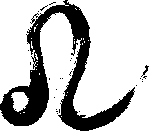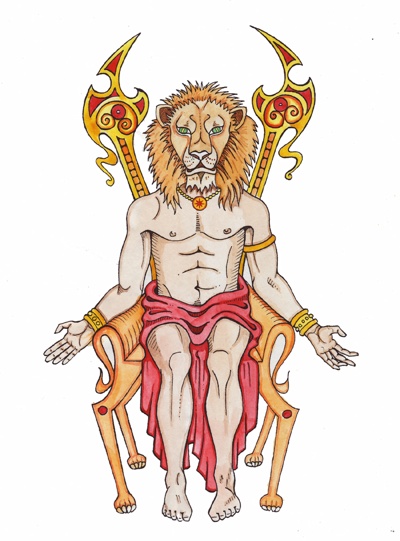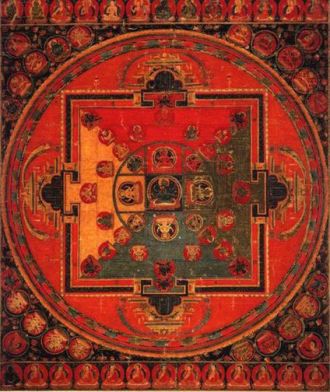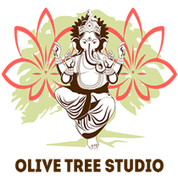CHARACTERISTICS
The sign Leo is in effect from approximately July 21st until August 22nd each year. Ruled by the Sun itself, Leo is characterized as hot, dry, fixed fire, and yang in nature. Its key symbol is the Lion, King of Beasts, for this is the sign of royal kings and heroes. The Babylonians knew it as Urgulla (the Lion), to the Greeks it was Leon, in India it was called Simha, and in China, Ta Shu, the Great Heat. The Celts celebrated with their midsummer feast, Lammas, on August 9th.
Leaders, superstars, people in positions of prominence and power are synonymous with the Sun during its brightest month when it becomes the visible symbol of the life force, which is at the core of our existence. For this reason, Leo is said to rule the heart, our central organ of life. Leos love to warm others up as entertainers and performers, hosts, organizers, and paternalistic leaders and providers.
The shining qualities that Leo best expresses are dignity, warmth, magnanimity, drama, and flamboyance. Leo’s like to radiate with great pride their obvious enjoyment of life and surround themselves with loyal friends and/or subjects who applaud their beneficence. Yes, they like their ‘strokes’. Like cats (which many Leos adore), they’ll purr with pleasure when shown affection and appreciation. Like all fire signs, however, they prefer their own autonomy and will ‘lick their wounds’ in private rather than reveal weakness. Strength and courage are the qualities Leos like to cultivate as they pursue their path of individuation.
THE CONSTELLATION
The identification of the constellation of Leo is often described as the shape of a lion and it is composed of 52 visible stars, four of which are quite prominent. Regulus is the most notable and was considered one of the most important stars in all of astral mythology. A triple star, it is the 21st brightest star and is relatively close to our Earth. To the Persians it was known as Cor Leonis, the Lion’s heart. Regulus combined the warlike qualities of Mars with the wisdom of Jupiter. To the ancient priest-astrologers, if this star were prominent in the birth chart of a prince, he would be predicted to have a glorious reign.
Interestingly, the most notable event in this Leo constellation is the Leonid meteor showers, which peak around November 17th each year.

MYTHOLOGY
Like its Fire-sign complement, Aries, Leo has myths abounding with heroic figures. Leo, however, relates more to myths where themes of father, king or queen, and lion are prominent.
The tarot card, Strength, associated with Leo, portrays these themes by showing an angelic figure (male or female) closing the mouth of a lion. This theme of taming the animal nature, or vital force by consciously directing the will is repeated in the many stories of Leo heroes or heroines.
The most popular myths involve both Hercules in his 12 labors, slaying the Nemean Lion, and Samson, of Old Testament fame, also slaying a Lion with his own bare hands. There are also many references to great all-powerful female goddesses such as the Egyptian goddess Sekhmet, the lion-headed goddess, who may have been one of the original archetypes for this sign. The Greeks told of Rhea, wife of Cronus, who gave birth to an enormous array of famous mythological children including Zeus, Poseidon, Hades, Hera, Demeter, and Hestia. The Babylonians had Ishtar, who was often depicted as riding upon the back of a lion. Cybele, the Mountain Mother, was another goddess connected with the wild beasts of the forest. The Greek story of Atalanta is quite graphic in portraying a goddess abandoned by her father, who becamse fiercely athletic and competitive with men. These themes of the struggle with the father imago, and a need to conquer or tame the fierce natural instinctual nature through a controlled use of the will, weave themselves in and out of so many of these ancient stories.
Kathleen Burt in her Archetypes of the Zodiac retells a more Eastern mythic tale from India, which I feel depicts more clearly the spiritual challenges of the sign. This is the story of Prahlad, the devoted one, who in his encounter with Narasimha, Lord Vishnu’s incarnation as the man-lion, proves that any Leo can prevail irregardless of birth or physical attributes.
Prahlad, like so many Leo’s, had big-time father issues. In this case, his father was a giant named Hiryana-Kasipu, which means ‘golden fleece’ in Sanskrit. The giant theme in myths truly shows how tiny children must see their adult mentors. To Prahlad, his father was quite evil because Hiryana-Kaipu felt that Prahlad didn’t deserve to inherit his kingdom because he considered him to be weak and less courageous than his younger brother. There was even the suspicion that his father was trying to kill him in order to give the throne to his brother. Therefore Prahlad began to pray most ardently to Vishnu for hours on end. He continued to pray vigilantly even when made fun of by his father, who truly was trying to poison him out of existence. Vishnu finally said he really couldn’t help him because Brahma had already given his father a boon of protection against death from enemies, man or beast, indoors or out, by weapons made by humans, gods or demons, in daytime or night. Quite an airtight boon!
Undaunted, Prahlad continued to pray until Vishnu, convinced by his determination, faith, and courage, appeared as a man-lion by jumping out of a pillar on the patio of the palace at twilight and killed Golden Fleece with one claw. We see here that the boon was effectively by-passed as Vishnu was neither man nor beast nor god, the time of day was neither day nor evening, the patio was neither indoors nor outdoors, and the claw was not a weapon made by men, gods, or demons. Was this creative or what?!!
The throne thus belonged to Prahlad, whose long-time courage and fasting had reduced him to a mere wraith, yet he had gained mastery of his fears through the superb test of his pride and courage. It is this internal fortitude that is the spiritual mastership of the sign. Prahlad’s test was really an emotional one in the face of his pain of rejection by his father and the ordeal of getting Vishnu to even hear him out. He became a very good and wise king who stayed with his kingdom, which is characteristic of Leo’s ability to keep the course. Deeper spiritual meanings can be gleaned from this story; for example the pillar, which Vishnu emerged from, is symbolic of the spine, the center of the energy-chakra system whereby power is transmitted.
Once Leos have mastered themselves from within, they are truly fit to be kings or queens. This obviously takes courage, faith, and long perseverance.
RELATIONSHIPS
Over the years working with many Leo types, I’ve come to the conclusion that a few qualities are absolutely necessary for them to have a good relationship with another. They are mutual respect, loyalty, and their right to maintain some aspect of sovereignty. Notice I do not say domination, though Leo’s, like Aries, are often accused of being too bossy. Leo’s need to feel that they have some dominion over that which they are sovereign, whether it be their home, or a portion of it, their work, or their creative pursuits. They also need to feel respected and feel respect for their mate. The partner who fulfills these qualifications, will be amply rewarded with warmth, affection, and some very good times. Leos, like all fire signs, love to play and have fun. They enjoy spontaneity and are quite romantic.
A Leo woman can sometimes intimidate men. They often see her as being so strong, self-assured, and decidedly able to manage on her own. Why would she possibly need them? Leos, however, like big cats, need their mate, and they prefer to mate for life if betrayal and dishonesty don’t wound them. Once wounded by such acts, they often lose trust and simply cannot find it in their hearts to forgive and forget, like some of the more mutable sign types are able to do. Pride often prevents them from taking a chance again with the same person, though there are certainly the exceptional ones who will take the risk, perhaps after taking some time to heal privately. Leos also can’t abide subtle tactics of manipulation. They prefer to be bold and upfront in their responses.
Leo’s truly do need the mystical marriage, the inner alchemy between the unconscious and conscious parts of themselves. Once they’ve done the hard inner work, as implied in the Vishnu myth, and conquered and mastered their shadow side, they make truly superb partners full of heart and radiance.
THE SHADOW
Hubris (or hybris) is the ultimate shadow of this sign. Wanting to be the best, the most outstanding, can lead to a desire to ‘be as the gods’. Many dictators are born under this sign such as Mussolini. The lineage of the Roman Emperors certainly portrays the worst of Leo’s shadow side from Augustus Cesar (founder of the month called August) on. The tyrannical path of such rulers is a saga of son rebelling at the father’s authority, takng the throne, and eventually becoming a tyrant himself.
When the inherent self-centeredness, actually necessary to the heroic quest, drops into the pit of vanity and selfishness, then Leo makes impossible demands on others, which cannot possibly be fulfilled. Arrogance of power is the result. Some very prominent leaders today, who are either Leos, or have Leo rising, are good examples of these more negative traits.
Women are no less exempt from this ‘enfant terrible’ syndrome. Many a family has been fragmented, and cohesiveness has been ruined by a feline hell-cat bent on having her own way at the cost of everyone else.
FAMOUS LEOS
There are a pantheon of famous Leos historically including Napoleon (The Lion), King Louis XIV; both bigger than life in their adventures, conquests, and theatrical displays of power and glory. One also thinks of Fidel Castro of Cuba who maintained his role at the helm of that tiny island nation for well over a half-a-century.
CARL GUSTAV JUNG, Leo Personified
C.G. Jung, born a Leo on July 26, 1875, personified the outstanding traits of nobility, masculine leadership, and a far-reaching influence in our understanding of the psyche through his chosen field of psychology. True to the Leonine path, Jung was most interested in the development of the Solar Path involving active, conscious participation and the use of one’s own will and understanding in the development of the Self.
His initial struggle with the archetypal father was dramatic. Freud, considered the ‘father of psychology’, was his mentor and friend until they split asunder, never to truly heal the schism between Freud’s more instinctual and sexually based theories of the id, ego, and super-ego (Freud was a Taurus), and Jung’s psychology of Individualism. Here is his own definition of Individuation “…a psychological process that makes of a human being an ‘individual’,—a unique, indivisible unit or ‘whole person.’”
.
NEPTUNE AND LEO
Perhaps, as Kathleen Burt suggests, Neptune is exalted in Leo. Jung certainly encouraged mysticism, and was far-ranging in his study of astrology, alchemy, mythology, art, literature, world religion, and philosophy. Dream-work, the study of the unconscious symbolic realm, is the Neptunian place where the gold is often found in inner work, as are the various meditative techniques that lead to both self-reflection and ultimately illumination. When merged with positive Neptunian qualities, Leo can truly enter into co-creativity with the Divine, and shine luminous and sublime as an inspired and compassionate ‘heart of gold’.
Genevieve A. Vierling C.A.P.
Astrologer
www.bluelightlady.com




 RSS Feed
RSS Feed


